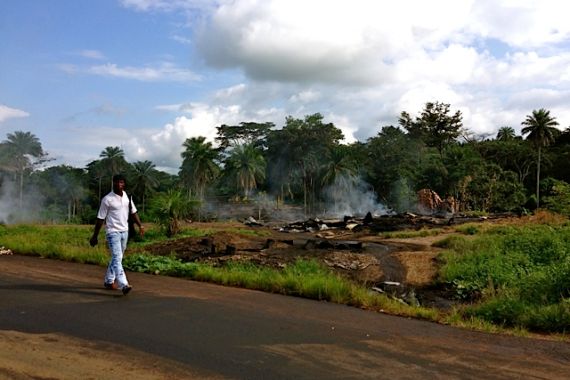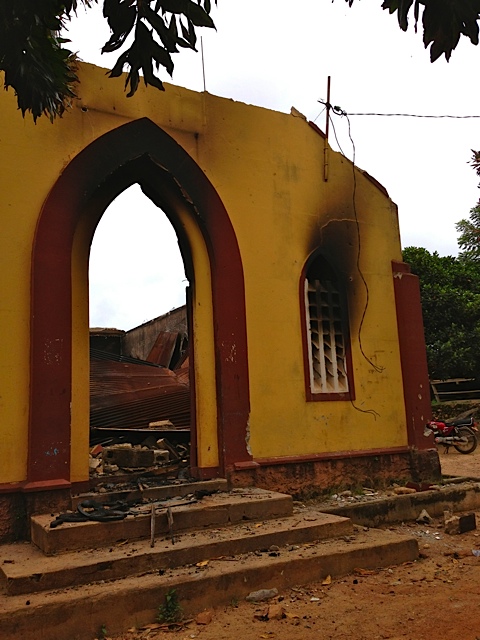Ethnic violence simmers in Guinea
Attacks starting in mid-July claimed at least 100 lives as Konianke people battled Guerzes with machetes.

Conakry, Guinea – Through the night sky thick smoke permeated the air, but witnesses saw no flames as they drove through Koule, a small town on the outskirts of N’Zerekore which is around 600km from Guinea’s capital, Conakry.
The region was the site of an attack on July 14, members of the Guerze community lynched a young Konianke man accused of stealing gas from a petrol station.
The Konianke people are primarily Muslims, and the Guerzes are people who come from the surrounding forests, and are generally Christian or animists. The young man’s boss, a car mechanic, heard about the killing, and decided to take matters into his own hands, gathering members of the Konianke community and attacking the petrol station.
There has been tension between the two communities before, and lynching’s and setting people on fire for alleged crimes, is common in this part of Guinea.
However, in this case, the scale of the violence after the lynching took everyone by surprise.
News of the fighting in Koule spread quickly to nearby N’Zerekore, Guinea’s second largest city. Gangs from both the Konianke and Guerze communities came out onto the streets. They were armed with machetes, sticks, knives and some with weapons. Petrol stations were burnt down; churches, and mosques were set on fire. People from both ethnic groups were savagely hacked to death, some were beheaded, and others were shot dead.
Guinea’s Government says at least 100 people were killed. By the time an Al Jazeera team reached N’Zerekore, all the bodies had been moved off the streets. Journalists were not allowed into the morgue at the main hospital, or permitted to speak to those injured on the wards.
However, one man who did not want to be named told Al Jazeera that there were some people – including children – still missing.
A grieving family
M’hawa and Makura are both sitting on a carpet in a courtyard surrounded by their children. There is an empty vacant look in their eyes and both women begin to weep as they tell their story.
 |
| At least 100 people were killed in clashes in the country’s second largest city, N’Zerekore [Nazanine Moshiri/Al Jazeera] |
They were both married to Soumaoro Mamadi, a Muslim from the Konianke tribe. They watched helplessly as their husband was dragged away from the gates of their house and men used machetes to hack him to death. His body was taken away by the military; and they don’t know where and if it has been buried.
They blame the Guerze Christian community. There have been small-scale clashes between the two religions particularly in the past few years. This family says it is confused about why two tribes and religions turned on each other in such a brutal way.
“We want justice we want those responsible for crime to be judged.” M’hawa the eldest wife tells me. “But we also want peace. We can’t go on cutting and killing each other.”
The root causes of violence
Government spokesman Albert Demanata Camara blames what happened in N’Zerekore on what he calls a “history of violence in this part of Guinea. There has been conflict there; there are many weapons and tension. Even some fighters from that war are now in N’Zerekore.”
Camara is referring to a history of tension that spilled over into Guinea during Liberia’s civil war, which ended in 2003. Liberia’s border is only 80km from N’Zerekore.
The Konianke – viewed as new arrivals in the region – are Muslims considered to be close to Liberia’s Mandingo ethnic community.
”[There
history of violence in this part of Guinea. There has been conflict there; there are many weapons and tension.”]
During the Liberian conflict, rebels fighting then-president Charles Taylor drew much of their support from the Mandingo community.
The Guerze, in contrast, were generally considered to be supporters of those forces loyal to Taylor.
However, Ronaldi Benvenue a young studious looking man insists there is a religious element to the tension in N’Zerekore.
“We have had problems here since 1991. They were political at the beginning now they are religious. The Muslims want to impose their religion on us.”
Benvenue said poverty is also a problem but “it is more about the Muslims who are trying to build mosques and convert everyone”.
Politics in turmoil
The opposition in Guinea has its own views about the causes of the violence. It points the finger of blame squarely at President Alpha Conde, who came to power in 2010.
Cellou Dalein Diallo is one of the main opposition figures in the country; he finished second to Alpha Conde in that election.”People have no confidence in the security forces in the administration in the justice system so they have tendency to take justice into their own hands,” Diallo said.
There were violent scenes in Conakry in May, when opposition groups came out to the streets to demand parliamentary elections, more than 50 people were killed, and 350 people wounded.
The elections, initially planned for 2011, were postponed several times because of a dispute between the opposition and the government over preparations for the vote.
The Government says elections will happen in September, and insists that the violence in N’Zerekore has nothing to do with the political situation in Conakry.
The Government has sent in the military and we did see soldiers outside churches, mosques and patrolling some street corners. However, it admits there is not much it can do with its limited resources.
“We do not have means to secure all of Guinea not just N’Zerekore.” Camara says. “We have been under an arms embargo since the Coup of 2008. We are putting in place a new army police and gendarmerie, but we are not able deal with all the situations as they arise at the same time.”
Guinea’s mineral wealth
Guinea’s government does not want the recent spate of violence to impact on the mineral trade.
There is too much at stake in Guinea to keep investors away for long, this lush mountainous country has some of the largest untapped deposits of iron ore in the world.
Moreover, it is the world’s largest exporters of bauxite, which is used to make aluminum, and Guinea also has deposits of gold and diamonds.
President Alpha Condé recently hired an international law firm DLA Piper to help renegotiate several mining contracts with companies including Rio Tinto and Vale. These deals were made under a previous regime, and many Guineans feel bitter that the country is not benefitting from these huge multi-billion dollar contracts.
Guinea development
Guinea ranks 178 out of 185 countries in terms of development. Half the population can not read and write, and that is no surprise as half the population also lives on less than a dollar a day, so they can not afford to pay for the books and transport to send their children to school.
Electricity and running water is also a luxury, Conakry, for example, is split into two zones. One area of the city will get power from 7pm-midnight one day, and then nothing the next day, and vice versa.
|
|
| Guinea anti-government protests marred by violence |
In N’Zerekore the power situation is even worse some areas will not have electricity for days.
During exam times students are often seen huddling together under the fluorescent lights of petrol stations, just so they can revise.
N’Zerekore representatives from both ethnic groups have signed a government brokered peace deal. The Guinean authorities have also announced a judicial investigation into the massacres.
The Mamadi family, are staying at home, as they are concerned that violence could flare up again at any time. There is shame and anger in N’Zerekore about what happened. People now have a choice; there can be reconciliation and peace, or perhaps more violence, which will impact on the whole region.